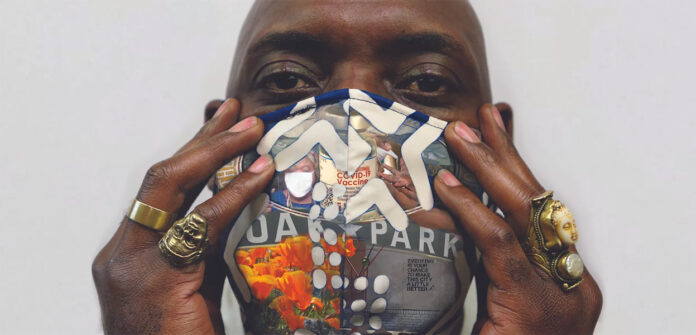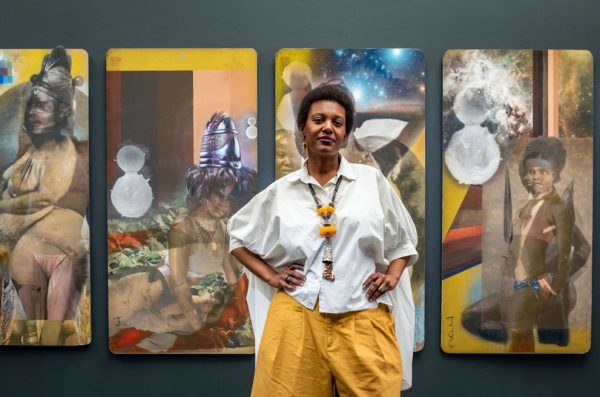
Bo Tefu | California Black Media
More than 20 California artists partnered with the state for the “Your Actions Save Lives” campaign. The effort was created to uplift and celebrate the resilience of communities and encourage safe practices that stop the spread of COVID-19 as Gov. Gavin Newsom’s plans to reopen the state on June 15.

The 14 original art projects included in the campaign range from murals, interactive exhibits, and live performances from artists based in communities highly impacted by the COVID-19, including Oakland, Sacramento, Stockton and San Diego.
“The arts have an opportunity to be uplifting and healing to your emotions,” said Jessica Wimbley, an African American digital artist who collaborated with the state for an advertisement on an Oak Park billboard in Sacramento and a digital art display at Arden Fair Mall in Sacramento.
“It’s been a breath of fresh air to work on this campaign. There’s been so much negativity and divisiveness that’s happening in the world that is heavy on the spirit,” said Wimbley.
“It’s been transformative to work on this project,” she added.
The campaign shows us that, “we can move forward, and we are moving forward. We all have things to live for,” she said.
The state partnered with the Center at Sierra Health Foundation in Sacramento for the project which relies on the power of art to communicate the importance of health awareness in addition to getting vaccinated.
“These accomplished artists are tapping into their culture and creativity to share empowering messages with communities that have been hard hit by COVID-19,” said Chet P. Hewitt, president and CEO of the Sierra Health Foundation.
“Art has incredible power, and we believe these works will spark important conversations, connections, and inspiration throughout the state,” he said.
Four female artists, including Wimbley, have used the project to tap into their respective cultures to create powerful visual artworks that empower and inform their diverse communities.
Sunroop Kaur, a classical artist, whose Spring mural is located in Stockton was inspired by her Punjabi-Sikh heritage. The interactive installation, ‘Benevolent Animals, Dangerous Animals,’ by Masako Miki located in Oakland’s Chinatown was inspired by Japanese folklore. In San Diego, the mural ‘Stop the Spread’ by Tatiana Ortiz-Rubio honors her Mexican heritage.
In addition to the art campaign, Newsom recently announced a $116.5 million incentive program that will reward people in California for getting vaccinated. The state allotted $100 million in grocery gift cards worth $50 each for the next two million people who get vaccinated. The remaining $16.5 million will be awarded as cash prizes to people who have been vaccinated across the state. More than 17 million people in California are fully vaccinated which is about 44 % of the state’s population. The incentive program aims to encourage everyone in California to get vaccinated with a goal to reopen the state by mid-June this year.
State officials say they are determined to fully reopen California schools and businesses in efforts to help the economy recover.
Black and Brown families continue to experience the brunt of the economic blow caused by COVID-19 despite the state’s efforts for community outreach to minimize hardship in their respective communities.
The artists featured in the state’s “Your Actions Save Lives” campaign hope to communicate messages of unity and solidarity through art influenced by their different cultures.
Four local artists celebrate their heritages and draw inspiration from their multicultural communities.
Jessica Wimbley
Wimbley, a renowned African American artist, uses her digital art to empower Black people to have agency in their own lives.
The Oak Park Billboard, which is part of a state-sponsored advertising campaign, features Wimbley’s husband as the model. The representation of dark-skinned Black men is important when there have been many incidents of people dying in the media.
The billboard reinforces, “This notion of a Black man living,” said Wimbley.
“It’s really important to bring humanization to the representation of Black people in media. And focus on producing an agency, and empowerment,” she said.
Wimbley’s Masking Series was inspired by the tradition of masquerade which is celebrated in many cultures across Africa. The art series features a still photo of a face with a mask modeled by her husband and a multimedia image with a mask reflecting different visuals.
“The storytelling communicates the important occurrences within the community, I was reflecting on wearing a mask within the masquerade culture and the transformative nature of both putting on a mask and wearing one,” said Wimbley.
Wimbley also wanted to humanize Black and Brown people who were disproportionately impacted by COVID-19. The added stress of police brutality resulting in the death of African Americans nationwide also inspired Wimbley to show that Black people have agency in their own lives.
Through her art, Wimbley said that she wants Black people, “to be in a place of empowerment, versus, a space of trauma.”
“We are a part of an interconnected story and part of each other’s stories. We have agency in how we move forward, and we can write, claim, and develop what that next phase looks like,” said Wimbley.
The symbolism of the images presented on the Oak Park billboard and the digital display at Arden Fair Mall highlight different codes that have inspired social justice movements throughout the nation. On the billboard, the model is wearing a mask with coded patterns promoting vaccinations and several rings, one with Harriet Tubman.
Sunroop Kaur
Kaur, an artist of South Asian descent, aims to decolonize classical art by using people of color as the center of attention in her paintings.
The large population of Punjabi Sikh immigrants in Stockton is a major influence in Kaur’s artwork. Kaur is intentional about using people of color as the focal point in her ‘Spring’ mural located at JMP Restaurant Supply.
“This mural is a visual celebration of my community and its resilience to not only survive in a foreign land but to thrive,” said Kaur.
The mural draws from the idea of, “decentering whiteness within my work by using people of color is my main fitters,” she said.
“The appropriation of Western classical art canons as a way to decolonize my own body and my culture,” she said.
The artwork includes two people socially distancing and wearing masks depicted through the Italian Baroque portraiture, a 17th-century art style associated with grandeur, movement, and drama.
The body language from the figures symbolizes, “the universal longing and yearning we feel for one another, but also acknowledging the fact that to keep our loved ones safe,” said Kaur.
The mural also includes pastel-colored floral patterns in reference to Spring which represents the reemergence of life following the pandemic. The mural includes royal blue arches as well as pink and malachite with historical pastel pigments that are part of Persian culture.
Tatiana Ortiz-Rubio
In her ‘Stop the Spread’ mural located at Bread & Salt Gallery in Chicano Park,
Mexican-American visual artist Ortiz-Rubio used the image of a Latina woman to raise awareness on COVID-19 safety precautions in her community.
According to national data, Latinos make up about 30 % of San Diego’s population. They were disproportionately affected by COVID-19 because a disproportionate number are essential workers or undocumented people.
“This is truly a message for anyone in the world because a pandemic has affected us all. But it hasn’t affected us equally,” said Ortiz-Rubio.
“In the United States, minorities have been affected because of their race and economic status,” she said.
Muralism was a social movement which helped foster systematic change in Mexico. Ortiz-Rubio said that the Black Lives Movement also inspired her to challenge racism and inequality through her artwork.
“It speaks to everyone, and the fact that it is a Latin American woman speaking to anyone, is also important because usually generalized images are of a White person,” she said.
Being a woman is an integral part of Ortiz-Rubio’s experience creating the mural. She recalled young girls and their mothers witnessing her paint the mural from their backyards which reaffirmed her desire to use a Latina as the centerpiece of her mural.
“It’s very empowering to be celebrated,” said Ortiz-Rubio.
“This will be a message that will take that stigma away,” she said.
The visual artist said that she wants Latin Americans to be represented and celebrated in her art especially when they are the target audience.
Masako Miki
The interactive art installation ‘Benevolent Animals, Dangerous Animals’ by Miki was inspired by the idea of a treasure hunt throughout Chinatown in Oakland. The pandemic forced people to stay indoors, but the public art installation encourages people to explore different shops and restaurants while admiring the art.
The artwork was inspired by shapeshifting animals in Japanese mythology.
“I wanted to make this positive and uplifting because when things are dark and difficult, we need to have more positive images,” said Miki.
The current reality of the pandemic is, “so dark and difficult that we need to have imagery that gives us the ability to envision something positive,” she said.
In Japanese culture the tiger is a majestic animal that is fearless, she says. The cultural message in the artwork echoes notions of toughness.
“Resiliency is our strength,” and the benevolent animals featured in the art are meant to encourage people to, “respect each other and have empathy to get through this difficult time together,” said Miki.
Recent incidents of violence against Asians have fueled racial tension in America, in addition to the violence toward African Americans nationwide. Miki aspires to use her artwork to dispel stigmas related to COVID-19 about the Asian community.
“We have to have this dialogue so that I can introduce my cultures in such a way that it becomes familiar and it’s not something that they’re afraid of because they don’t know about it,” said Miki.
Artistic performances and visual displays created by all the artists in the “Your Actions Save Lives” campaign have been exhibited since April and will continue until June this year.
California Black Media’s coverage of COVID-19 is supported by the California Health Care Foundation.



